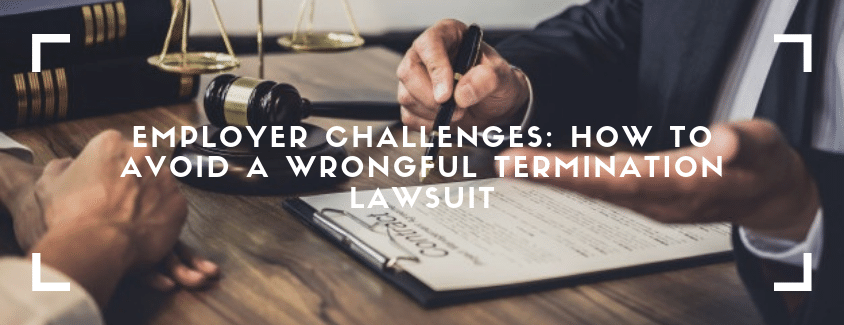Employer Challenges: How to Avoid a Wrongful Termination Lawsuit
Firing someone is a big decision, and you may feel totally justified in your actions after you’ve carefully considered it and weighed all your options. Yet the person you fire may feel differently. In fact, the person you fire may feel like you have done something unjust or illegal and may even try to sue you for it.
It’s important that you know your legal rights and responsibilities and that you act accordingly to avoid a wrongful termination lawsuit or other legal action. Here are a few things you can do to avoid such a lawsuit:

Know the Laws on Termination
In many states, employment is considered “at will,” which means that the employees can quit for any reason and employers can terminate them for any reason. Even in at-will states, you may still have obligations to your employees if you have a contract with them. It is important that you know what the employment laws are in your state before you terminate any of your employees.
Even if you do operate in an at-will state and don’t have a contract with your employees, you may still not be able to terminate them without legal consequences. It is always illegal to fire employees for the following reasons:
- Discrimination on the basis of sex, race, ethnicity, religion, age, or disability
- Retaliation for an employee reporting violations to state or federal agencies
- In response to an employee refusing to commit an illegal action
- Because the employee took time off for family or medical leave
There may be other reasons that you cannot fire an employee legally. If you ever have doubts, talk to an employment lawyer first.
Document Everything
If an employee does bring a wrongful termination suit against you, you will need to defend your actions and prove that what you did was legal. The best way to prove your case is to have plenty of documentation and evidence.
Before you fire an employee, you should have plenty of documentation on file, such as the warnings you gave the employee along the way, plans you put in place to help the employee improve, performance reviews, and reports from co-workers or supervisors. You should also document specific evidence of wrongdoing, such as a log of how many times the employee was late or absent, emails that an employee sent using inappropriate language, or even the final product an employee created that lost you a client.
You should also document the termination. You can ask another person to be present during the conversation, and you can ask the employee to sign forms upon leaving. You want to be sure you can prove everything that you did and said leading up to and including the firing.
Establish Clear Termination Procedures
Creating clear termination procedures can help you protect yourself against legal action later. Termination procedures can include:
- A process for penalizing employees after mistakes have been made, such as a system of warnings and reviews
- A procedure for firing employees, such as having a witness present during the discussion
- Forms that employees must sign after they have been terminated
- Policies on how fired employees collect their personal belongings, how the must turn over company property, and
how they can collect their last paycheck and any severance - Schedule for conducting exit interviews
You may need to add more to your procedures depending on your business and the kind of employee you fire. It is important that you consult with an employment lawyer to develop your termination policies.
Consider a Waiver
You are allowed to ask an employee to sign a waiver that gives up their right to sue for wrongful termination in exchange for some form of compensation. Some employers include this clause in the paperwork they ask employees to sign when accepting their severance package. Again, talk to a lawyer to help you draft this document and to be sure that you are protecting yourself legally.
You can’t make yourself completely impervious to legal action for wrongful termination, but following these steps will greatly reduce your risk. It’s important that you consult with an employment lawyer to develop your employment policies so that you don’t end up making mistakes that can cost you dearly later. Once the policies are in place, be sure that your managers are all following them carefully.
Denton Peterson is a business employment law firm that can help you develop termination policies to protect your business against a wrongful termination suit. If you are already subject to legal action, one of our wrongful termination attorneys can represent you and help defend you against the claims. Our attorneys are committed to help protect your business so that it can continue to operate for many years, as smoothly as possible. Contact our firm in Arizona today to talk with a wrongful termination lawyer about how we can help you.
Approved By:

Brad Denton – Denton Peterson, PC
1930 N Arboleda #200
Mesa, AZ 85213
Office: 480-325-9900
Email: [email protected]
Website: dentonpeterson.com